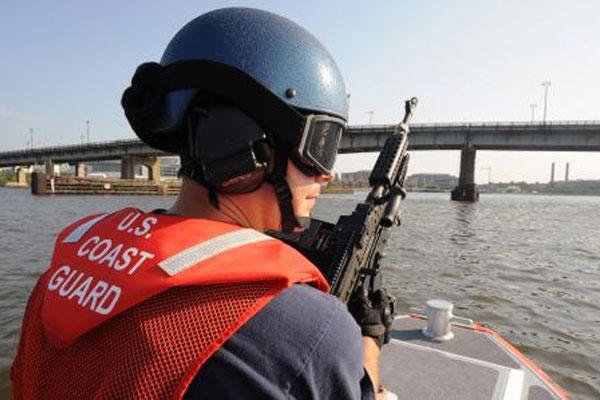As the summer sun sets over Washington, D.C., the sky over the Potomac River turns a spectacular golden hue as members of Coast Guard Station Washington head out for another mission patrolling the waters and keeping the American people safe.
From ensuring public safety and security on the water along the country’s most iconic landmarks to multi-agency national security and law enforcement missions, a “typical day” at Station Washington is anything but typical.
The multi-mission station operates 24 hours a day, seven days a week.
Even though Washington is a seasonal boating area, the commanding officer of the station, Lt. Celina Ladyga, says the crew stays busy all year with operations and special national security events like the presidential inauguration and State of the Union address.
“It’s really quite a wide breadth of Coast Guard missions that we do here,” said Ladyga.
Station Washington was established after Sept. 11, she said, and its primary responsibility is homeland security. She said there was no federal maritime presence in the National Capital Region prior to Sept. 11.
“We do a heavy amount of protection of maritime critical infrastructure, but we also do all of the traditional Coast Guard missions, such as search and rescue, and public boater outreach,” she said.
Station members were active in National Safe Boating Week in May, meeting with local boaters and reminding them of the important tips for staying safe on the water, including always wearing a life vest, filing a float plan and having emergency communication devices.
During one weekend, Station Washington crews conducted patrols for Operation Dry Water, a national crackdown on boaters operating vessels under the influence.
National Safe Boating Week and Operation Dry Water are both multi-agency efforts aimed at keeping the American public safe on the water.
Ladyga said maintaining and growing relationships with local, state and federal partners is important, especially when jurisdictions overlap and cases can be complex.
“The multi-agency connection and partnerships are very critical in this area,” she said. “Ultimately everybody has the same goal – to ensure the safety and security of the American public.”
Ladyga also has advice for boaters who are heading out enjoying the Potomac River and other waterways around our nation’s capital.
“It’s important for us to take the time to enjoy the waterway, but we need to do it safely,” she said.
She said boaters need to have the proper safety equipment, should also keep an eye out for anything suspicious and have the necessary contact information for authorities should they observe anything unusual.
“Knowing who to call and how to make that report is a critical piece because it’s really all of our responsibility to ensure the safety and security of the waterway,” said Ladyga.
On the Potomac River, Coast Guardsmen can be seen conducting patrols near the Lincoln Memorial, enforcing a security zone during Washington’s Fourth of July fireworks, boarding vessels, interacting with boaters and maintaining a safety zone.
Chief Petty Officer Jasen Hollopeter runs the station’s day-to-day operations, including scheduling harbor patrols and security and safety zones to keep the public safe.
Conveniently located in Washington, the station is a popular stop for leaders from other military branches or members of Congress who want to see Coast Guard operations firsthand, said Hollopeter.
“That’s the unique thing about where we are,” he said. “You have all these other branches of service and members of Congress who may not be familiar with Coast Guard operations, so we are their first impression of the Coast Guard.”
Being in Washington also gives crewmembers unique opportunities as well, such as Petty Officer 1st Class Benjamin Atkins, who is the petty officer in charge of training for the station who experienced a unique opportunity while re-enlisting.
“I just re-enlisted at the National Archives. I was able to re-enlist right in front of the U.S. Constitution,” he said proudly, noting that nowhere else would he of had such a magnificent opportunity. “It was great.”
At Station Washington for about a year, Seaman Alexander Smith works on pretty much everything as a non-rate – from general maintenance, fielding phone calls, working on his qualifications to getting underway.
“I’ve enjoyed my time at Station Washington. I love it,” said Smith.
Smith, who is performing on-the-job training to be a boatswain mate, doesn’t plan on stopping once he makes petty officer third class.
“I think it would be nice to hear ‘Master Chief Smith,’” he said with a smile. “That would be pretty cool.”
But for now, Smith and the rest of the crew vigilantly standing watch, protecting the American people and living the Coast Guard core values in the nation’s capital.
Semper Paratus, Station Washington!





























